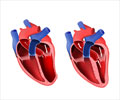Using a novel population of stem cells, researchers at Children's Hospital of Pittsburgh of UPMC have successfully repaired damaged heart muscle in an animal model.
Researchers at the Children's Hospital of Pittsburgh of UPMC, utilizing a newly-discovered population of stem cells from the human skeletal muscle tissue, have repaired an injured heart muscle in an animal model.
Led by Johnny Huard, PhD, the researchers transplanted stem cells purified from human muscle-derived blood vessels into the hearts of mice that had heart damage similar to that which would occur in people who had suffered a heart attack.Dr. Huard, director of the Stem Cell Research Center at Children's Hospital's John G. Rangos Sr. Research Center said that the transplanted myoendothelial cells repaired the injured muscle, stimulated the growth of new blood vessels in the heart and reduced scar tissue from the injury, thereby dramatically improving the function of the injured left ventricle.
"This study confirms our belief that this novel population of stem cells discovered in our laboratory holds tremendous promise for the future of regenerative medicine. Specifically, myoendothelial cells show potential as a therapy for people who have suffered a myocardial infarction," said Huard.
He added: "The important benefit of our approach is that as a therapy, it would be an autologous transplant. This means that for a patient who suffers a heart attack, we would take a muscle biopsy from his or her muscle, isolate and purify the myoendothelial cells, and re-inject them into the injured heart muscle, thereby avoiding any risk of rejection by introducing foreign cells."
He also claimed that the myoendothelial cells used in this study were more effective at repairing the injured cardiac muscle and reducing scar tissue than previous approaches that have used muscle cells known as myoblasts.
At six weeks after injection, the myoendothelial cell-injected hearts functioned at 40 to 50 percent more effectively compared with hearts that had been injected with myogenic cells, or the myoblasts.
Advertisement
Source-ANI
TAN/L














